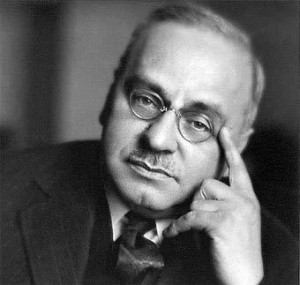
| Born: Feb 7, 1870 in Rudolfsheim near Vienna, Austria-Hungary |
| Died: May 28, 1937 (at age 67) in Aberdeen, Scotland |
| Nationality: Austrian |
| Fields: Psychotherapy |
| Famous For: Individual psychology |
Alfred Adler was the founder of the school that came to be known as Individual Psychology. He was also a psychotherapist and a doctor of medicine. His work concentrated on what he dubbed the inferiority complex and the role this played in a person’s feelings of isolation and the development of their personality. Adler was a pioneer in emphasizing the role social factors had to play in readjusting individuals to the community.
Adler’s Childhood
Adler was born on February 7, 1870, in the Austrian town of Penzig. He suffered from rickets as a young child and could not walk until he was four years old. He then only narrowly escaped dying from pneumonia. This traumatic experience led the boy to aim to become a medical doctor, but he struggled academically, especially in mathematics.
Despite this, Alfred’s father refused a suggestion from a teacher that the boy might do better as a cobbler’s apprentice rather than in school. Encouraged by this support, Alfred turned his school life around to the extent that he later topped his math class.
Adler’s Later Education
After studying medicine at the University of Vienna, Adler graduated in 1895. Seven years later, he was an early supporter of the ideas of Sigmund Freud regarding the interpretation of dreams, although he later came to object to what he saw as Freud’s overly rigid analysis.
Adler had himself published a book a book by this time in which he set forth a different theory, which explained how a person would be considered as a whole individual, rather than in the Freudian terms of id, ego, and superego. Adler also objected to what he saw as Freud’s erroneous tendency to ascribe sexual roots to most psychological troubles.
Adler’s Theories and Contributions
After several years of increasing tension between the two men, Adler left Freud’s inner circle in 1911 and set up a group of his own with a few like-minded men. In 1912, he first used the term “individual psychology” in his book The Neurotic Constitution.
In this work, he considered people in terms of how they related to the groups in which they lived: society as a whole, co-workers, family, etc. During World War One, Adler worked as a physician on the Russian Front and later with children, coming to see the immense suffering that could be caused by individuals who were misguided enough to send armies to do their bidding.
After the war, Adler set up a children’s clinic in Vienna, which proved so successful that it inspired others around the world. While in this role, he investigated the roles played by pampering and neglect at each end of the spectrum of personal development.
He felt that by the age of five, children had already largely developed their self-images. From the late 1920s onward, he gave well-attended lectures at Columbia University and became a Visiting Professor at Long Island College of Medicine in 1934. His clinics were forcibly closed by the Nazis in 1934 because of his Judaism, and he took his family to the United States. Three years later, while on a lecture trip to Scotland’s University of Aberdeen, he died of sudden heart failure.